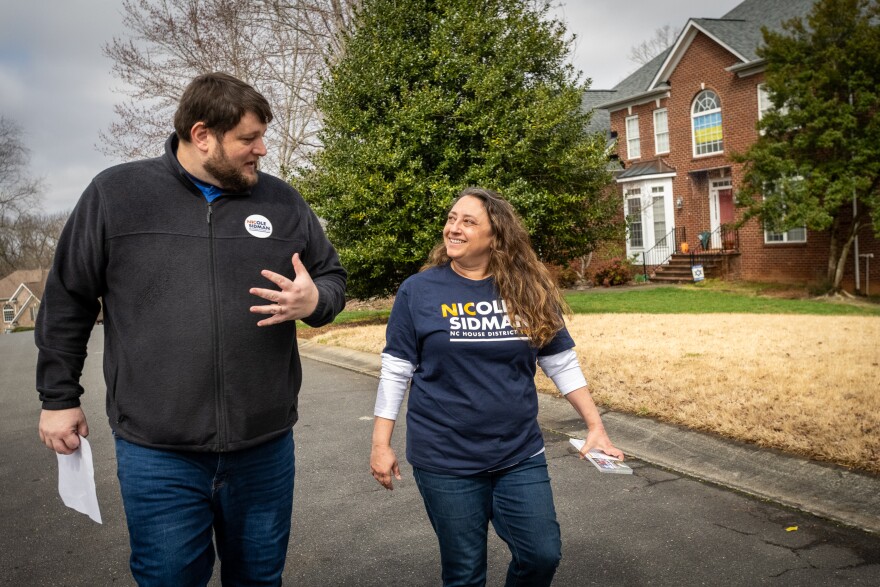CHARLOTTE, N.C. — Nicole Sidman walked up a long driveway in a hilly suburban neighborhood of Charlotte, campaign flyers in hand, ready to talk about an issue that prompted her to run in the Democratic primary for the state legislature this year.
A chubby white Chihuahua named Frankie came running when she rang the bell. Rebekah Rubenstein opened her door.
"I know who you are!" Rubenstein told Sidman. Rubenstein, who has three daughters, quickly told Sidman she plans to vote for her and will bring her 8-year-old daughter to the polls to be part of a moment she described as critical.
"For my children to be able to have the right — now, in the future, any time — to make the choices about their own bodies is essential," Rubenstein said. "So that's 100% in the forefront of my vote."
Concerns about new restrictions on abortion are motivating voters and candidates alike in North Carolina primary races. It's an issue that the Biden campaign hopes will energize voters not just on Super Tuesday, but also in November's presidential election.


Only one Democratic presidential candidate has won this state in modern times — former President Barack Obama, in 2008, by the narrowest of margins.
Democratic Gov. Roy Cooper said he believes this issue will put North Carolina in play. He isn't running this time — the state has term limits — but the race to replace him is shaping up to be a barn burner, and the Republican supermajority in the state legislature is on the line, too.
"When you add issues like reproductive freedom, when you add the biggest governor's race in the country — those things, I think, come together to make North Carolina ground zero in 2024," Cooper told NPR in an interview at the governor's mansion in Raleigh.
"You can care about more than one issue, but this is one where we need to make clear about the stark difference between Republicans and Democrats. Women's reproductive freedom depends on getting Democrats elected across this country and particularly in North Carolina," Cooper said.
A Democrat from Charlotte switched parties to help Republicans pass an abortion ban
There may be no place in the state where voters are more acutely aware of the stakes in the abortion debate than in and around Charlotte.
After the Supreme Court overturned Roe v. Wade, other Southern states passed abortion restrictions. For nearly a year, North Carolina still allowed the procedure up to 20 weeks.

But then, a Democratic state House representative from Charlotte, Tricia Cotham, switched parties and gave Republicans a decisive supermajority in the legislature. That allowed a 12-week abortion ban with limited exceptions to pass — one that the governor could not overturn with a veto.
That moment is what prompted Nicole Sidman to run. She described an overwhelming feeling of powerlessness watching the Republican supermajority restrict abortion access.
"And there's nothing anyone could do to stop them except for getting out and voting for the right people in November," she said.

Yolonda Holmes is also running in the competitive Democratic primary. On Saturday, she was outside the South County Regional Library, handing out her campaign flyers. She said she is running in part to avenge the party switch that left many Democratic voters feeling betrayed.
"Turning that pain into passion and turning that anger into action," she said.
Cotham is running for reelection as a Republican in a newly drawn GOP-leaning district. She declined to comment for this story.
Outside the library on the last day of early voting, Democratic voters like Sharon Smith said abortion was a top issue for them.
"It's crazy that we've come this far and now we're taking millions of steps backwards," said Smith, who came out to vote with her husband and adult son.

Abortion is a powerful issue. But so is the economy
Janice Robinson heads the state chapter of Red, Wine and Blue, a group that works to harness the political power of suburban women of all backgrounds. She told NPR the Supreme Court decision rattled women in the state.
"It was like you woke a sleeping giant," she said. "Women started mobilizing. We saw a groundswell."
This year, her group will be organizing around reproductive rights — not just abortion access, but also birth control and IVF.
But Jonathan Felts, a longtime Republican strategist, said Democrats shouldn't bet on abortion politics putting them over the top in North Carolina. Felts is working for a super PAC supporting Lt. Gov. Mark Robinson, the front-runner in the Republican gubernatorial primary.

Felts said voters are particularly focused on the economy, a weak spot for Biden in polls.
"You have some voters who will be motivated by abortion. Those voters, though, they already decided who they were voting for 18 months ago, for all intents and purposes," Felts said. "And so persuadable voters — they are looking at a variety of issues, not just this one issue."
Copyright 2024 NPR. To see more, visit https://www.npr.org.



